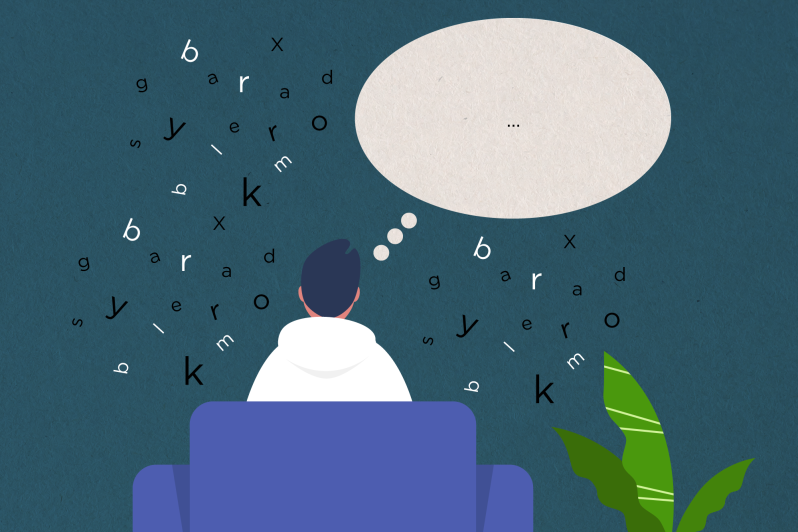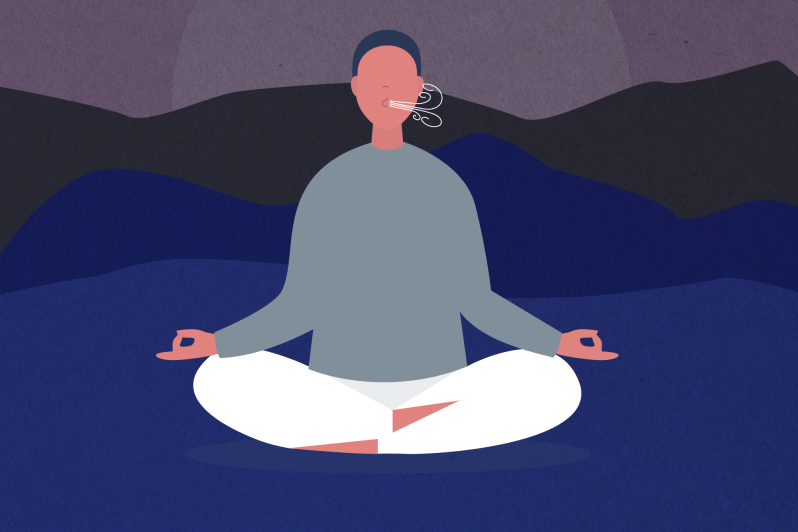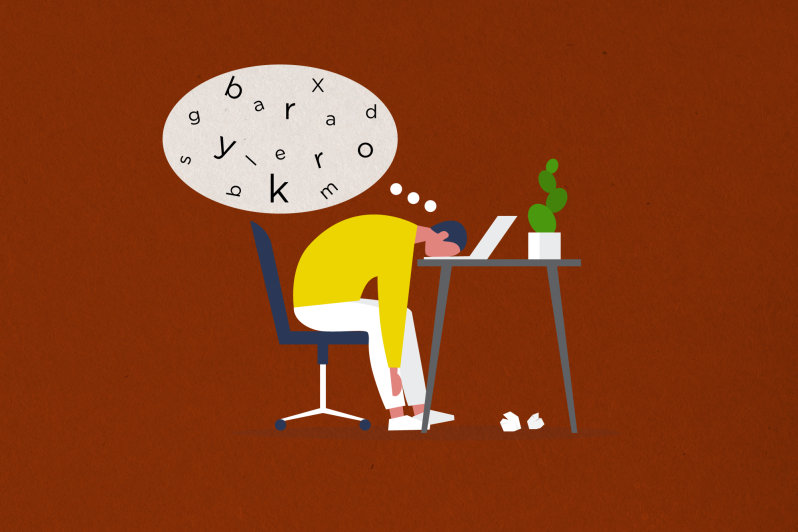We all respond to stress differently. For some, it produces a panic of tail-chasing “what if” ideation or sets off a downward spiral of lethargic cynicism. For others, it leads to explosive overachievement, which doesn’t seem that bad until you run out of stuff to clean, cook, or organize. And for still others, stress is a trigger for serious disorders like anxiety, depression, addiction, and self-harm.
These are all side effects of the brain and body going into “emergency mode.” When your brain senses danger, it signals the body to shut down anything unnecessary, while turning up the senses to maximize your perception of where and whom the danger is coming from.
None of that would be so bad if we only experienced stress on an occasional basis. Our primal ancestors certainly got stressed out when they saw a wild animal stalking them, or when a lightning storm threatened to incinerate their village. But as we’re all too well aware, stress is a constant presence in our lives today.
Modern threats to survival have typically been more social in nature — we’re worried over whether a new shirt makes us look fat, or if we’re going to miss a deadline or flub an interview. Just because these threats don’t come with fangs or fire doesn’t make them easier to deal with. At its core, stress is always about the struggle to survive. When you take everyday concerns about financial security, future opportunities, the state of government and the economy, and the well-being of family and friends, and then add a new and frequently lethal virus into the mix, you’ve got a seriously debilitating load of stress.
That’s why we — you, me, us, everyone — need to start meditating right now.

Meditation helps with weathering the coronavirus lockdown for the same reason it helps with any type of stress — by giving your brain a chance to fix itself. According to neurological studies over the past decade, the synapses in our brain tend to favor the same pathways over and over. Just as you have your favorite route to take to work (you know, back when you used to work outside the home), your thoughts, ideas, and opinions tend to take the same route from the subconscious to the conscious brain. This process creates actual grooves in your brain that make it even easier to fall into the same patterns of thought. So if you have a groove that views a situation negatively, every new idea (even a positive one) is likely to be interpreted negatively by the time it reaches your conscious thought.
Meditation fixes this by flattening out those grooves, giving your ideas a chance to take the road less traveled by. In doing so, it’s been shown to help with things like gaining a new perspective on stressful situations; building skills to manage stress; focusing on the present; and increasing patience, tolerance, and imagination while reducing negative emotions and responses to stimuli.
Further Reading
- How to Meditate: A Guide for Beginners
- End the Stigma Around Men’s Mental Health
- A Complete Guide to Self-Care for Men
Needless to say, our current global situation makes meditation more important than it’s ever been. If you’re being a good citizen and abiding by shelter-in-place guidelines, your usual outlets and distractions aren’t available anymore. Without the freedom to go for a jog or meet up with friends at your favorite watering hole, how are you supposed to clear your head? And the distractions of TV, Internet, and takeout food you can only get you so far.
Meditation is just as important for essential workers, who are living at the other end of the spectrum. While the rest of us are just suffering from boredom and malaise, medical caregivers and other essential service providers are running a never-ending rat’s maze, trying to work an already overpacked schedule under the constant threat of contracting the virus from the people they serve. Believe it or not, meditation can help these people, as well.
It’s hard to believe something as simple as sitting still and thinking positive thoughts (or no thoughts at all) could help in such a complicated time as this. We’re here to tell you the proof is in the doing. Give meditation a try — just 5 to 10 minutes a day — and see if you don’t feel just a little bit better. It might not change the world, but it can at least change your world. And in challenging times like this, that’s not nothing.
Benefits of Meditation
Meditation helps heal physical issues
According to Harvard Health, when you’re under constant heavy stress, your adrenal glands overproduce the hormone cortisol. Too much cortisol in the system deals a serious blow to the function of your immune system, as well as the health of other organs in your body.
While you can’t always do much about the stress you’re under, meditation is here to help. By activating the parasympathetic nervous system, meditation helps your body rest, recover, and reset. By stopping the overflow of cortisol, your body is able to regulate breathing, bring down elevated blood pressure, restore normal organ function, and put the immune system back to work.
We’re not just saying this, either. A 2009 study on patients with heart health issues showed that those who practiced meditation once per day experienced over 40% fewer heart attacks and other “cardiovascular events.” Even more tellingly, 80% of the patients who participated in the study were still practicing meditation nine years later. But even if heart health isn’t your issue, you can still benefit from meditation’s beneficial impact on conditions like asthma, irritable bowel syndrome, tension headaches, and chronic pain.
Meditation helps you sleep
Much as we’re all enjoying those middle-of-the-night text threads with fellow quarantined insomniacs, we’d be better off getting good sleep during this time of high stress and uncertainty. Not only does daytime sleepiness sap your productivity (no good when you’re adjusting to working from home), but it also deteriorates your overall health and your mental and emotional resilience.
Fortunately, the same benefits of meditation listed above help overcome a racing mind and physical restlessness. By spending just ten minutes a day on a meditation practice that focuses on your breathing and brings your mind’s attention to the present, you can trigger a full-body relaxation response that gently ushers you into a deep, restorative sleep.
Meditation helps with anxiety, depression, and addiction
This should come as no surprise. Meditation has been studied for decades as a deterrent to those who struggle with behavioral disorders like anxiety, depression, and addiction. The idea is that meditation calms and reassures the “wanting mind,” which creates its own obstacles to well-being by being always on high alert for threats while reaching out for this perfect panacea that lies just beyond our grasp. In past years, that panacea might have been a romantic partner, a better job, or just getting the last word in with your snarky brother-in-law. But now, of course, it looks like taking that vacation you had to cancel, enjoying a two-hour meal in a restaurant full of happy people, or even just a hug from your mom.

Meditation is key to helping quell the wanting mind by restoring your focus on the here and now. And you may be saying, “The here and now is exactly what I’d like to avoid.” But the thing is, mindful grounding yourself in the present is actually the best way to exit the spiral of self-harmful behavior. By helping you be fully present in the moment (instead of worrying about the future or ruminating on the past), meditation helps you climb out of your brain’s habitual groove and see things in a more interesting and newly positive light. As a bonus, it increases your interleukin levels (providing you with greater energy) and triggers your body to release chemical toxins that affect neurotransmitter receptors and alter your mood.
Meditation helps with conflict management
Sartre’s immortal words “Hell is other people” are truer than they’ve ever been, thanks to this pandemic. Your roommates drive you crazy with every little cough or throat clearing. Your spouse’s mood swings are aggravating your own. Your kids, your pets, your neighbors, even your houseplants are making you wish that you could start life over as a hermit on top of a mountain. Of course, even if you lived there, there would still be the internet to fill your soul with rage at the cesspool that is humanity in 2020.
Deep breath. It’s okay to admit that shelter-in-place has you feeling (and acting) more … prickly, shall we say? We’re all feeling it, and meditation is here to help.
Our cultural assumption is that conflict is only resolved by the strongest argument. Make a better case than your opponent (or just shout louder than they can), and you’ve won. But in fact, researchers are finding that something called “relational agility” is actually more effective in resolving conflict. This skill involves working with everything that comes up in a human interaction, including elements that are felt rather than articulated. (For example, your roommate says it’s fine with them if you blast music while you clean out your closet, but you get the vibe that they are really not fine with it at all.)
By slowing down your thought process and tuning you into the sensations of the present moment, meditation can help you step outside your own ego-centered perspective to sense what’s important to the other person. In other words, it helps you develop compassion. And rather than interpreting their response negatively (there are those brain grooves again) as selfishness, rudeness, or pure crazy, it allows you to see their more vulnerable side — they feel just as afraid, uncertain, and flat-out bored as you do. Once you’ve made those relatable connections, it’s hard not to interact with more grace and patience, even in the midst of conflict.
Meditation helps you appreciate simple things
Remember when you used to wish you had more time to fill in the blank? Read poetry, cook elaborate meals, practice guitar, listen to the entire catalog of your favorite musician, etc.? Well, you’ve got it now — how is all that going for you?
If you’re like us, you might not have crossed many of these time investments off your bucket list, even after four or more weeks of shelter-in-place. Why? Because the fast-paced digitally influenced society we’ve been living in for the past 20 years has groomed our brains to have the attention span of a cocker spaniel on four shots of espresso. As a result, even now that we have all the time in the world to spend on things we love, we’re wasting that time the way we always do: Scrolling through our phone or complaining how there’s nothing to watch on Netflix.
Meditation is the key to making the most of this time. Much as we hate to be all Pollyanna, it’s undeniable that this is the quiet moment we’ve been waiting for all our lives, and as much as it sucks, why not make the most of the opportunity? It might never come again — we hope it doesn’t.
So dust off that record collection or that anthology of short stories, and before you dive in, spend 10 minutes meditating to get yourself in the right frame of mind to really soak it up.
Meditation makes you more creative
If you’re like me, you’re finding yourself running out of household projects that will use up your free time. If you’re saving the last bits of mold to clean out of the shower like a favorite imported wine, it’s time to turn your energy toward a more artistic endeavor. Meditation can help with that.

One of the fun discoveries from meditation research is that it works along very similar lines as taking a consciousness-enhancing drug, like psilocybin or LSD. After booting your brain out of its habitual grooves, meditation induces high-frequency brain waves associated with attention, perception, and divergent thinking, allowing you to notice and feel things in new and unusual ways. From there, it’s just a matter of applying those brain waves to the kernel of an idea. And if you tend to be a perfectionist, good news: Meditation also boosts your ability to bounce back from a failed attempt and even negative feedback from others.
This isn’t just for artists, poets, and musicians. Major corporations like Google, Goldman Sachs, and Medtronic have introduced meditation to their employees in hopes of spurring more creative thinking to get ahead in the marketplace. So even if you’re a firmly left-brain kind of guy, practicing meditation can supercharge your work-from-home productivity and — who knows? — position you for a serious professional promotion once life gets back to normal.
Meditation puts good vibes into a world that needs them badly
This is where it gets woo-woo, but just hang with me, okay? Sure, meditation improves your individual experience of the world, and that’s not nothing. But there are schools of thought, especially within traditional spiritual circles, that practicing a certain form of meditation known as “lovingkindness meditation” sends positive energy out into the world that can support our collective understanding, compassion, and cooperation. In other words, one person meditating for 10 minutes a day creates a ripple effect that improves the lives and experiences of people they’ll probably never meet.
There’s a lot of weird science around this, much of it having to do with the mysterious realm of quantum physics. But the central idea is that the collective consciousness of every living thing creates a unified field, like a medium that we all live in. Each action and thought contributes to that field, for good or for harm. For a good analogy, notice what happens to the overall temperature of your house if you open the door to a cold bedroom or closet. The unified field is like that; the “temperature” of one person’s mind-body-spirit feeds into the experience of the whole.
We get it, this one is a little bit out there. But right now, we could all use every bit of healing power and positivity available to us. So what’s the harm in putting some good intentions out there, even if they’re woo-woo? At worst, it’ll make you feel better for having done something good for yourself and for humanity.


